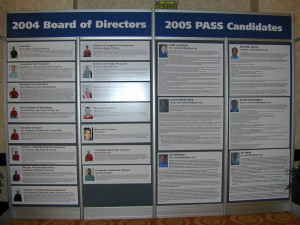
The 2004 PASS Board of Directors
On December 19, 2013, the PASS board of directors (BoD) proposed a small and targeted set of bylaw changes in response to CA relinquishing the BoD seats they were entitled to as a Founding Partner in the professional association.
How Did CA Get Involved with PASS?
You might be wondering “How did a company that doesn’t seem to make a lot of SQL Server tools get a seat on the board of this huge, international SQL Server professional association?”
It’s a bit of a shaggy-dog story, so I’ll sum it up quickly. Back in the late 1990’s, there was a large and successful database tools company known as Platinum Technology. Platinum was instrumental in establishing other successful professional associations, such as IDUG, and as an independent software vendor who made add-on tools for database administrators, wanted to encourage similar growth in the SQL Server niche.
Platinum put one of their executives, Steve Vandor, in charge of the initiative to start a SQL Server professional association, who in turn sought out and won additional buy-in Microsoft to get the ball rolling. An initial meeting was convened in early summer (aside, this was only foundational meeting I wasn’t present for) with community members, professional association management executives, and executives from Microsoft and Platinum. Papers were signed. Plans were made. Then, Platinum was acquired by CA.
(Feel free to read more about CA and its relationship with PASS, if you like).
What Did CA Ever Do for PASS?
It seems pretty obvious to anyone who’s ever been to a PASS Summit the sort of contribution that Microsoft makes to the community. They’re there in a big way, especially in the last several years. Kudos!
But what about CA? You might be aware the CA sponsors the data architecture virtual chapter monthly meetings. And that certainly makes a lot of sense considering the strength of their great data modeling product, ERwin. And you may recall, if you’d attended PASS Summits in years bygone, that CA used to have a large presence in the exhibit hall. But for the average rank-and-file member of the organization, you probably hadn’t seen or heard much from CA of late.
But that doesn’t mean the CA wasn’t doing good things for PASS. As I described in my blog post Do You Have One of “the Three W’s” to Sit on a Board of Directors?, the CA BoD members were particularly strong in the third “W” of wisdom. It’s hard to quantify the ROI for PASS by having Rick Bolesta and Neil Buckwalter on the BoD since wisdom doesn’t come with an industry standard metric. But let me assure you that it was significant.
The quality of decision-making was always improved by having these two at the table and, perhaps most significantly of all, Rick and Neil provided the greatest degree of continuity that the board had. No one else had served as long on the BoD or been through as many ups and downs as these two. Although I have full confidence in the BoD, there’s a certain nostalgia for me that there won’t be anyone on the board who was there from the beginning. This is a natural and good thing for organizations, to mature to the point of a new generation of leadership unencumbered by older generations. But I think that the context and historic insight that Rick and Neil could provide will be missed.
Ok, So CA Was Good for PASS. What’s the Hidden Issue?
Let me start off by saying that I believe that the proposed changes are absolutely appropriate and valuable. They’re also very well written to be targeted and directly address the problem at hand.
But there is a hidden issue present in the changes. Say what? Let me explain. While it’s not explicitly written anywhere, PASS leadership has always attempted to balance the formulation of the BoD to ensure a good mix among the various stakeholders in the community. That is to say, it’s important that the BoD contain a good mix of directors from consulting, corporate IT, the vendor community (full disclosure: I work for a vendor), government/not-for-profit, and other groups. There have been times in the past where most people seeking director positions were independent consultants. This makes a lot of sense for the candidate, since they’d be the most likely type of person to see an upside for their service. But I’m sure you can imagine a scenario where a BoD overly tilted toward one group or another, say a BoD composed entirely of consultants, might set strategy that didn’t serve the other constituencies in the best way possible. however those attempts at balancing the board were strictly informal and, basically, not institutionalized. In other words, there’s no formal set of checks-and-balances. (The establishment of the Executive Committee was one of the few checks-and-balances written into the Bylaws).
So the hidden issue is this: the PASS Bylaws contain only one explicit stipulation for the stakeholder composition of the BoD. It ensured that CA and, by extension a proxy for all of the vendor community, got a seat at the table.
You might point out that the BoD is not intended to be a representative body, like the Congress or the UK House of Commons. True indeed. Directors at-large do not have “constituencies” in the same sense as elected officials. On the other hand, it’s an important part of a large, public professional association that the various needs of its constituent parts have a voice in the strategic direction of the organization. PASS certainly recognizes this and is taking steps to create governance structures that will boost is rapid growth around the world, outside of its long-standing base of North America and Europe. A global re-balancing is definitely at the top of the list.
But is that the only modification needed? Now that CA is stepping away from the BoD, it might be time to investigate the merits of allowing specific constituencies within the community of voice in the wider community.
What do you think? Do constituencies need representation in the professional association? Or are we done with this conversation?
I want to hear what you think!
-Kevin

Speak Your Mind